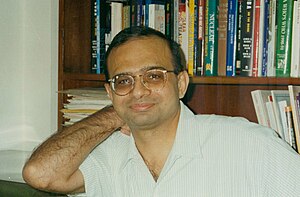This is an old revision of this page, as edited by Harshray (talk | contribs) at 10:05, 15 January 2009 (Undid revision 264228085 by ClueBot (talk)). The present address (URL) is a permanent link to this revision, which may differ significantly from the current revision.
Revision as of 10:05, 15 January 2009 by Harshray (talk | contribs) (Undid revision 264228085 by ClueBot (talk))(diff) ← Previous revision | Latest revision (diff) | Newer revision → (diff)
Brahma Chellaney is Professor of Strategic Studies at the New Delhi-based Centre for Policy Research, an independent, privately funded think-tank. Until recently, he was also a Member of the Policy Advisory Group headed by the External Affairs Minister of India.
Professor Chellaney is widely regarded as one of India's leading strategic minds. He is very well known as a commentator on regional and international issues in the realm of strategic affairs.
He is one of the authors of India's nuclear doctrine and its first strategic defense review. Those contributions came when Professor Chellaney was an adviser to India’s National Security Council until January 2000, serving as convenor of the External Security Group of the National Security Advisory Board, as well as member of the Board’s Nuclear Doctrine Group.
Education and career
Chellaney holds a Ph.D. in arms control. A specialist on international security and arms control issues, Professor Chellaney has held appointments at the Harvard University, the Brookings Institution, the Johns Hopkins University's School of Advanced International Studies and the Australian National University. His specialization includes energy and climate security, terrorism and nuclear issues.
Professor Chellaney is also a newspaper columnist and television commentator. He writes opinion articles for the International Herald Tribune, Wall Street Journal, The Japan Times, The Times of India, The Asian Age and The Hindustan Times. In 1985, he won the Overseas Press Club of America's Citation for Excellence.
Professor Chellaney is a potential contender for the post of India's National Security Advisor, in particular if the opposition comes to power in nationwide elections scheduled for April-May 2009.
Publications
He is the author of five books.
His latest book is the best-selling Asian Juggernaut: The Rise of China, India and Japan (HarperCollins, 2007). This book focuses on a resurgent Asia’s potential emergence as the global pivot. Asia’s significance in international relations is beginning to rival that of Europe in the 18th and 19th centuries. With the world’s fastest-growing markets, fastest-rising military expenditures and most serious hot spots, Asia holds the key to the future global order. The book examines the ascent of Asia by focusing on its three main powers — China, India and Japan. It argues that how the China-Japan, China-India and Japan-India equations evolve in the coming years will have a crucial bearing on Asian and global security.
Another recent publication is a smaller, 100-page book, On the Frontline of Climate Change: International Security Implications (KAF, 2007), with Heela Najibullah. This is a study of the larger strategic ramifications of global warming. Given that climate change can only be slowed but not stopped, the book contends that the subject should be elevated to a national-security issue. It argues that Asia is likely to bear the brunt of climate change, making it imperative for Asian states to build greater institutional and organizational capacity.
Professor Chellaney has published research papers in International Security, Orbis, Survival, Washington Quarterly, Security Studies and Terrorism.
Category: